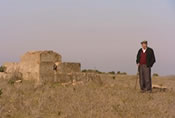During the forty years of Franco’s dictatorship all competing accounts of Spanish history were suppressed through the imposition of state sponsored censorship. It is only during the last ten years or so that documentary filmmakers have begun to make films about the experiences of the losing side of the Spanish civil war. A lot of these films are being shown this month at the Cine Doré.
Something interesting happened while we were watching last night’s documentary. There was an older couple in the audience who were clearly in favor of Franco’s version of events, and consequently dedicated themselves to making disparaging comments throughout the film. Sort of like Mystery Science Theater 3000, only for retrograde octogenarian right-wing fascists. The 15 or so people that were in the audience kept shushing them and asking them to please keep it to themselves, because every time someone on screen would say something about how hard it was to either work under slave-like conditions in the construction of the Guadalquivir canal system, or to live in a pueblo among the very same neighbors who informed on your husband and insulted your children because they were the offspring of “rojos,” this terrible couple would make loud snide comments to each other. An usher was forced to come in and sit in their row to discourage them from talking back to the screen. So for the last half hour, this lady was content to just sigh loudly whenever she didn’t agree with something in the film. And when Franco would appear on screen, or if there was a clip showing the political prisoners kneeling in front of their captors, or if a a fascist procession appeared, the old man would say things like, “Eso!” (which is essentially a way to say, “That’s what I’m talking about!”) It's amazing how horrible these nostalgic Francoists are, and how these deep divisions in Spanish society have continued to exist for 70 years and more. What we couldn’t understand is why these people don’t just stay home and watch the old newsreels. After all, Franco and his regime got to tell the “official” history for 40 years. Let’s at least have some variety.

1 comment:
that's fascinating.
glad to see you both are doing lots of cool stuff while over there.
Post a Comment